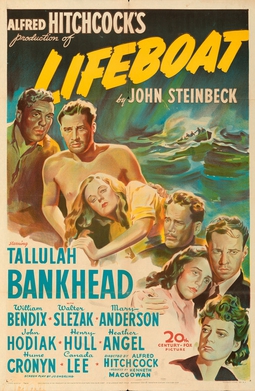The timing here was interesting, two completely different types of movies, and I couldn't help but be slightly amused by it. I just recently reviewed Around the World in 80 Days, a huge scale epic that had locations around the world. Then there's this review, an entire movie set on an adrift boat at sea. I love a good epic, but an entire movie contained on one set? That's impressive. The movie is 1944's Lifeboat.
On its way to England during WWII, an Allied supply ship crewed by merchant marines is attacked by a German U-boat and sinks. Aboard a sturdy lifeboat, respected writer Connie Porter (Tallulah Bankhead) rescues Kovac (John Hodiak), a member of the crew from the engine room. Connie tells him that the German U-boat sunk as well in all the chaos. Minutes pass and they begin to pick up other survivors until there is nine of them all told. Among them is a German sailor, Willi (Walter Slezak), who no one is sure what to make of. Should they throw him overboard or keep him as a prisoner? With food and water limited, their decision could directly affect their survival.
Do you need proof that director Alfred Hitchcock was a director far ahead of his time? First off, if you said 'yes,' shame on you. Second, this film should serve as proof....if it was some how needed. Some four years before his 1948 film Rope and 13 years before 12 Angry Men used the formula, Hitchcock films the entire movie on one set, in this case the lifeboat adrift at sea. The entire movie. There are no asides or flashbacks or anything that distracts from the very singular location. This well-made, sturdy boat ends up being a weirdly compelling additional character. By the end of the movie, you feel claustrophobic and alone. Not a lot of directors could pull this premise off successfully, but Hitchcock seems to do it with ease.
Working with an ensemble cast, Hitchcock brings together a group of actors/actresses from all walks of life with more than a few differences in background. Bankhead as Connie gets top billing and delivers a solid performance but is far from sympathetic. Hodiak brings a tough guy edge to his part as Kovac, the former slaughterhouse worker turned sailor and maybe the one thinking the clearest. Slezak ends up being Evil Incarnate as Willi, the German sailor who knows more than he is letting on. Also look for William Bendix as Gus, the lovable sailor wanting to get back to his dancing girlfriend, Mary Anderson as Alice, a young nurse nervous about reaching London, Henry Hull as Rittenhouse, a proud, self-made businessman, Hume Cronyn as Sparks, the radioman who bonds with Alice, Canada Lee as Joe, the black steward, and Heather Angel as Mrs. Higgins, a mother traveling with infant to visit her husband.
What is impressive about the film can also be a weakness depending on your point of view. Hitchcock chooses not to use any gimmicks or tricks in developing a story that clocks in at 97 minutes. There are no marauding sharks circling the boat or patrolling plane overhead. This is an ultra-personal story that is entirely contained within the confines of the boat. Because there is nothing to distract from the task at hand, this is a dialogue-heavy movie. At times, it gets to be a little much. You can only hear so many monologues about the past and how people got here, their beliefs and relationships before things get a little on the slow. When it does work though, it's great. The story gives a window into mob mentality, especially when survival is on the line. Not surprisingly, you react differently to a situation at hand when life and death hangs in the balance.
Setting the survivor story (yeah, alliteration!) during WWII was no doubt a timely one. I can't help but wonder though what the story would have been like in a more existential setting; just survivors on the open sea hoping to make it to land or rescue of some sorts. Yes, the Willi character and his sinister motives are necessary, but that could have been tweaked too. The WWII dynamic is one thing, but a solid, interesting story detours and degenerates some in the finale as a propaganda message is not to subtly blared at us as a viewing audience. Oh, Germans are bad! There was potential for a twisted, darker ending in the closing minute, but the propaganda shuts the door on that possibility. Still, it's an impressive movie, and one that's easily recommended.
Lifeboat (1944): ***/****


No comments:
Post a Comment